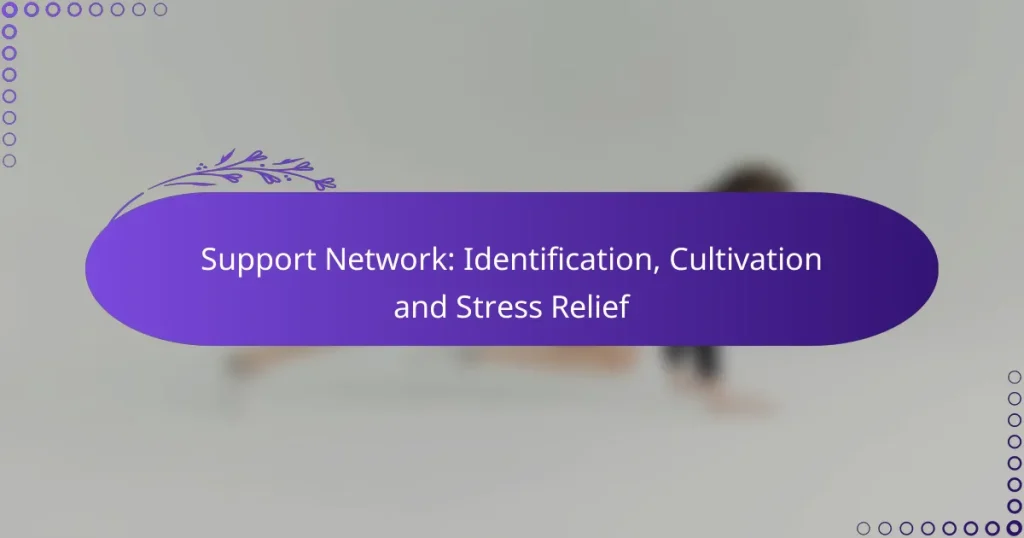Building a strong support network is essential for emotional well-being and stress relief, especially in a bustling environment like New York City. By identifying local resources, engaging in community activities, and fostering meaningful connections, individuals can create a robust system of support that not only alleviates stress but also enhances resilience in facing life’s challenges.
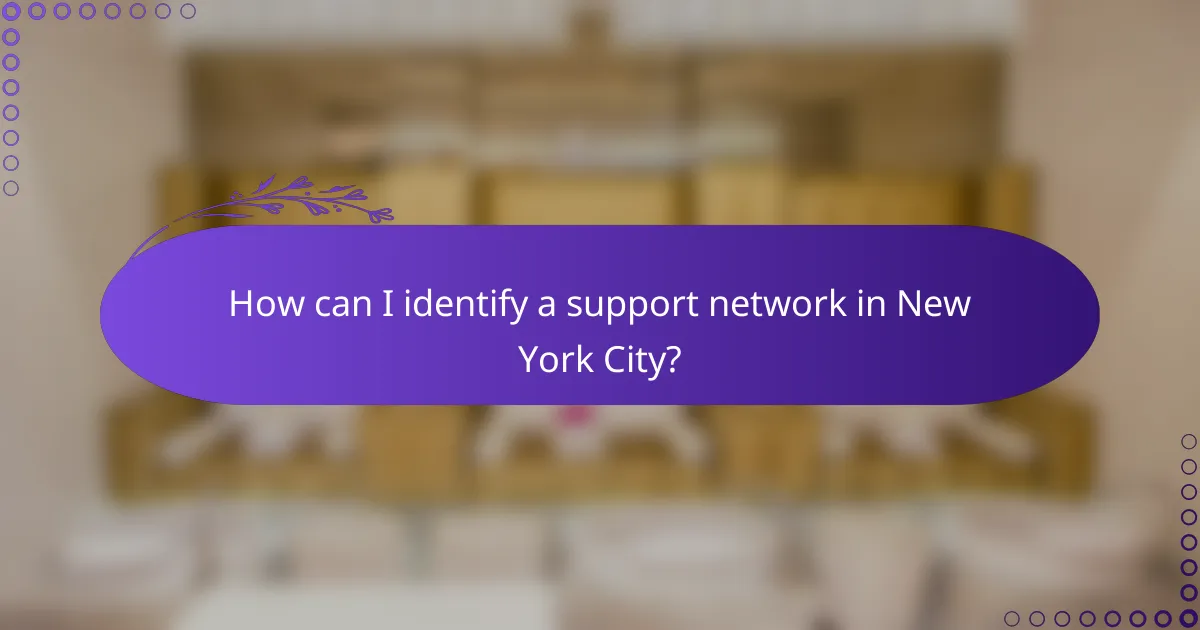
How can I identify a support network in New York City?
Identifying a support network in New York City involves exploring various community resources, groups, and platforms that can provide emotional and practical assistance. Focus on local community centers, support groups, online forums, social media, and professional networks to build a robust support system.
Community centers
Community centers in New York City often serve as hubs for social interaction and support. They typically offer programs and activities that foster connections among residents, making it easier to meet like-minded individuals. Look for centers in your neighborhood that host workshops, classes, or social events.
Many community centers also provide resources for mental health support, including counseling services and group therapy sessions. Check their schedules for events that align with your interests or needs.
Local support groups
Local support groups are invaluable for connecting with others facing similar challenges. In New York City, you can find groups focused on various issues, such as mental health, addiction recovery, or grief support. Organizations like the National Alliance on Mental Illness (NAMI) offer listings of support groups throughout the city.
Joining a support group can provide a safe space to share experiences and receive encouragement. Many groups meet regularly, allowing for ongoing support and relationship building.
Online forums
Online forums can be a great way to connect with others outside of your immediate area. Websites like Reddit and specialized forums offer spaces where individuals can discuss their experiences and seek advice. Look for forums that focus on your specific interests or challenges to find relevant discussions.
While online interactions can be helpful, ensure that you engage in forums that promote positive and supportive environments. Be mindful of the information shared and verify advice when necessary.
Social media platforms
Social media platforms like Facebook and Instagram can help you identify and connect with support networks. Many groups and pages are dedicated to specific causes or interests, providing a space for members to share resources and support each other. Search for local groups that align with your needs.
Engaging with these communities can lead to meaningful connections, but be cautious about privacy and the quality of information shared. Always prioritize your safety when interacting with others online.
Professional networks
Professional networks can offer support in career-related matters and personal development. Organizations such as Meetup or LinkedIn host groups where professionals gather to share knowledge and resources. These networks can provide mentorship opportunities and connections that may help you navigate challenges.
Consider attending networking events or workshops to expand your professional circle. Building relationships within these networks can lead to both personal and professional growth.
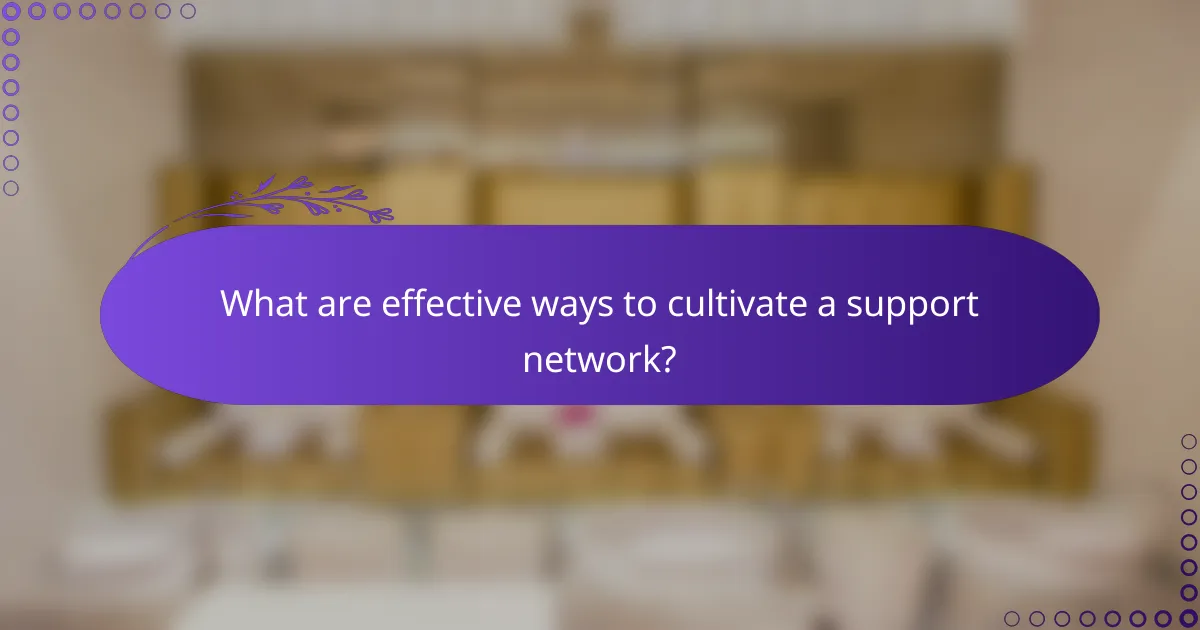
What are effective ways to cultivate a support network?
Effective ways to cultivate a support network include actively participating in community activities, joining clubs that align with your interests, and engaging with others through volunteering. These strategies not only help you meet new people but also foster meaningful connections that can provide emotional and practical support.
Attend networking events
Networking events are designed to bring people together for professional and personal growth. Look for events in your area that focus on your field or interests, such as industry conferences, meetups, or local business gatherings. These settings allow you to meet like-minded individuals and establish connections that can lead to lasting relationships.
When attending, prepare a brief introduction about yourself and your goals. Follow up with new contacts afterward to solidify the connection, perhaps through email or social media platforms like LinkedIn.
Join interest-based clubs
Joining clubs centered around specific interests, such as book clubs, sports teams, or hobby groups, can be an excellent way to meet people who share your passions. These clubs often provide a relaxed environment where members can bond over common activities, making it easier to form friendships.
Consider exploring local community centers or online platforms to find clubs that suit your interests. Participating regularly will help you build rapport and deepen your connections with fellow members.
Volunteer in the community
Volunteering offers a unique opportunity to meet people while contributing to a cause you care about. Local charities, shelters, and non-profit organizations often seek volunteers, providing a chance to connect with others who share similar values.
Choose a cause that resonates with you, as this will enhance your experience and help you form genuine relationships. Regular volunteering can lead to a strong sense of community and support among fellow volunteers.
Engage in local workshops
Participating in workshops allows you to learn new skills while meeting others with similar interests. Look for workshops in areas such as arts, technology, or personal development, often hosted by community centers or educational institutions.
These interactive settings encourage collaboration and networking, making it easier to connect with others. Be open to engaging with participants during breaks or group activities to maximize your networking potential.
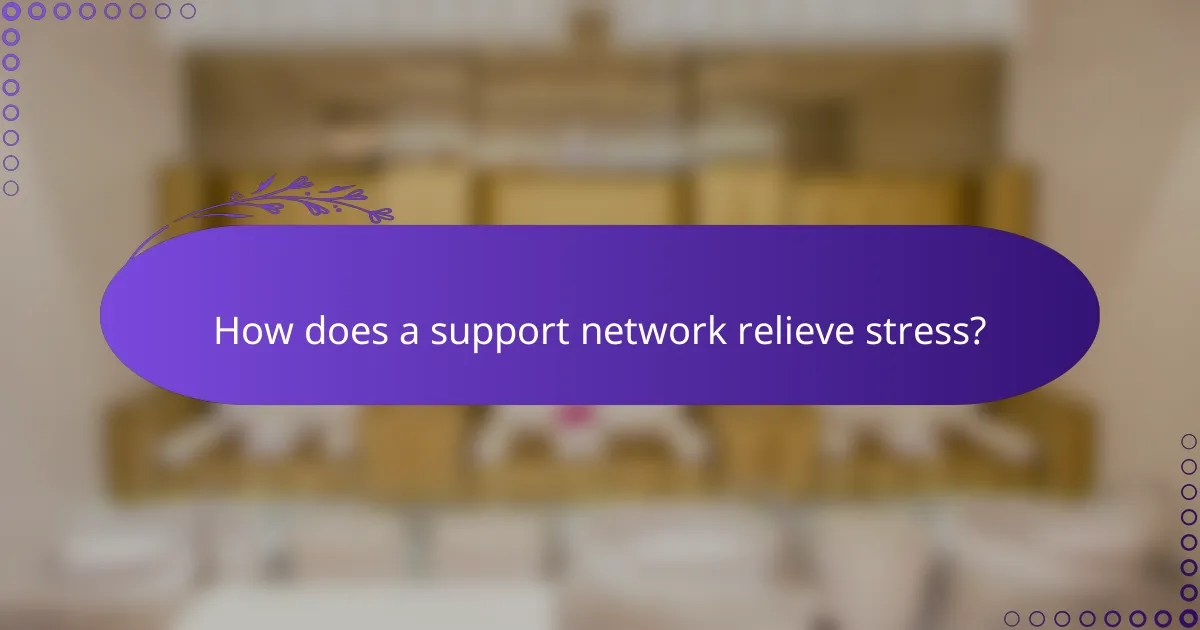
How does a support network relieve stress?
A support network alleviates stress by providing emotional comfort, practical resources, and accountability. These connections foster resilience, enabling individuals to navigate challenges more effectively and reduce feelings of isolation.
Emotional support
Emotional support involves understanding, empathy, and encouragement from friends, family, or peers. This type of backing can significantly lower stress levels by creating a safe space for individuals to express their feelings and concerns.
For example, simply having someone listen to your worries can make a substantial difference. Engaging in regular conversations with supportive individuals helps reinforce feelings of belonging and reduces anxiety.
Resource sharing
Resource sharing within a support network can include exchanging information, advice, or tangible assistance. This collaboration can help individuals access solutions they may not have considered, thereby easing stress related to problem-solving.
For instance, sharing local resources such as mental health services, community programs, or even childcare options can provide practical relief. Creating a list of available resources within your network can be a simple yet effective way to enhance support.
Accountability partners
Accountability partners are individuals who help keep each other on track with personal goals, which can reduce stress stemming from procrastination or lack of motivation. Having someone to check in with can foster commitment and encourage progress.
For example, if you’re working on a fitness goal, partnering with someone who shares similar objectives can provide mutual encouragement and accountability. Setting regular check-ins or progress updates can strengthen this partnership and enhance motivation.
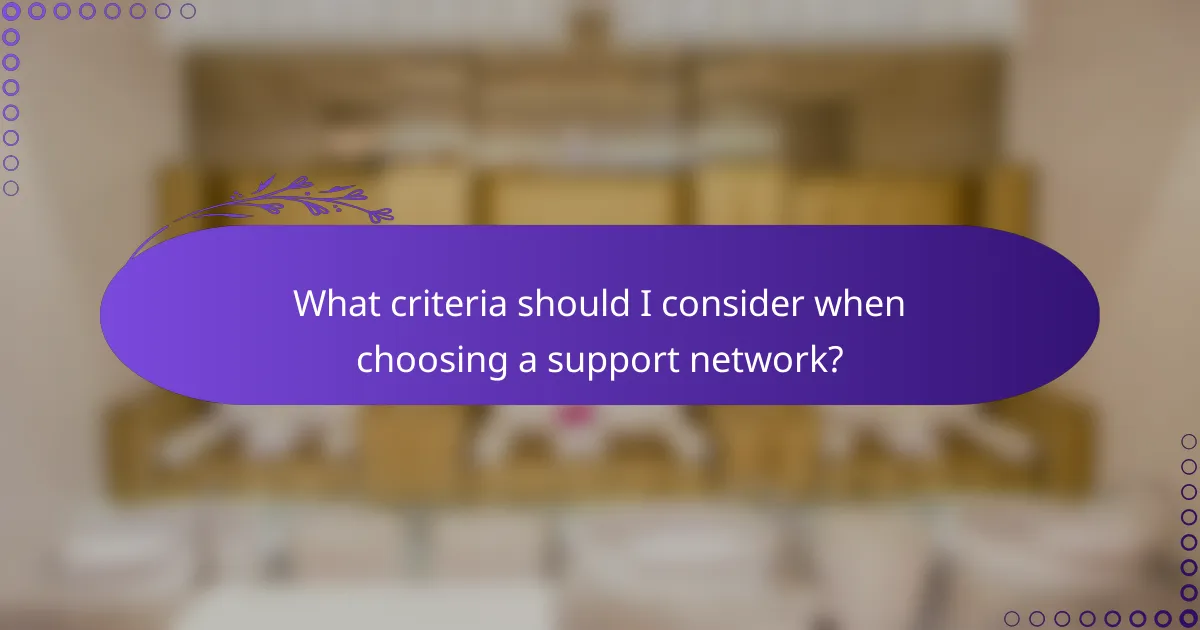
What criteria should I consider when choosing a support network?
When selecting a support network, consider factors like shared values, accessibility, and diversity of perspectives. These criteria will help ensure that your network is effective in providing emotional and practical support tailored to your needs.
Shared values
Shared values form the foundation of a strong support network. When members have common beliefs or goals, it fosters trust and understanding, making it easier to communicate openly. Look for individuals or groups that align with your core principles, whether they relate to personal growth, mental health, or specific interests.
For example, if you prioritize wellness and self-care, seek out communities that emphasize these values. This alignment can enhance the quality of support you receive and create a more cohesive group dynamic.
Accessibility
Accessibility is crucial for a functional support network. Consider how easily you can reach out to members, whether through in-person meetings, phone calls, or online platforms. A network that is readily available increases the likelihood of receiving timely support when you need it most.
Evaluate the geographical location, time zones, and preferred communication methods of potential network members. Aim for a mix of local and virtual connections to ensure you have support available in various situations, especially during challenging times.
Diversity of perspectives
Diversity of perspectives enriches a support network by introducing different viewpoints and experiences. This variety can lead to more comprehensive solutions and insights, helping you navigate challenges more effectively. Seek out individuals from various backgrounds, professions, and life experiences to broaden your understanding and approach to issues.
For instance, a network that includes people from different age groups, cultures, or fields can provide a wealth of knowledge and alternative strategies for coping with stress. Embrace the differences, as they can enhance your resilience and problem-solving abilities.
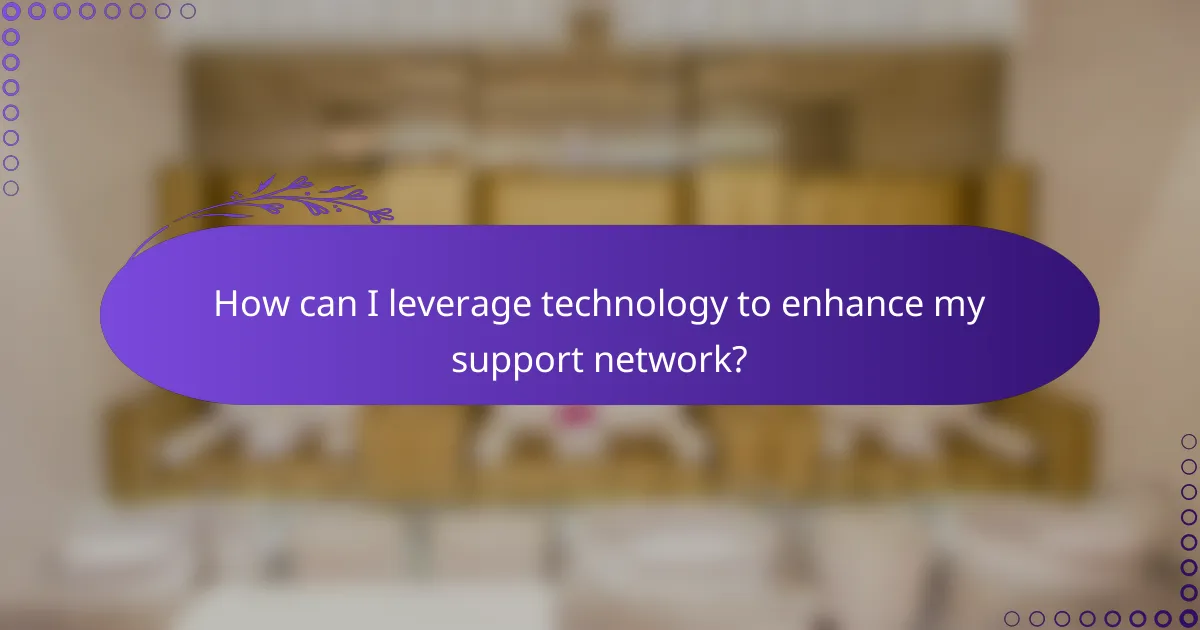
How can I leverage technology to enhance my support network?
Technology can significantly enhance your support network by facilitating communication and connection with others. Utilizing various tools and platforms allows you to maintain relationships, share experiences, and access resources more efficiently.
Use apps for connection
Apps designed for social connection can help you stay in touch with friends, family, and support groups. Popular platforms like WhatsApp, Facebook, or Meetup allow for easy messaging, video calls, and event planning, making it simpler to engage with your network.
When selecting an app, consider its features, user base, and privacy settings. For example, group chat functionalities can foster community, while video conferencing tools like Zoom or Skype can facilitate face-to-face interactions, even from a distance.
To maximize your app usage, regularly check in with your contacts and participate in group activities. Set reminders for virtual meetups or discussions to ensure you stay connected and actively engaged with your support network.
